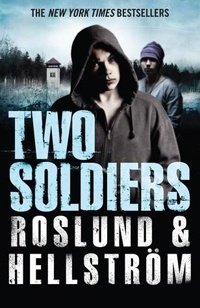 Written by Roslund & Hellström — This is the third novel from the Swedish crime writing duo to be translated into English. Anders Roslund is a journalist and criminologist. Börge Hellström is a reformed criminal who now works diverting kids away from gang culture. Together, they write novels which explode with action, but also use their fiction to examine modern Swedish society.
Written by Roslund & Hellström — This is the third novel from the Swedish crime writing duo to be translated into English. Anders Roslund is a journalist and criminologist. Börge Hellström is a reformed criminal who now works diverting kids away from gang culture. Together, they write novels which explode with action, but also use their fiction to examine modern Swedish society.
The two soldiers of the title are gang leaders Gabriel and Leon, who head up the Raby Warriors in southern Stockholm. They have no-one to trust but each other and refer to themselves as brothers. Gabriel is free but Leon is locked up. They have set in motion a scheme, not just to break Leon out, but to cause such havoc and destruction that their notoriety will increase ten-fold. They put their plans into action indifferent to the harm they may cause to others and without any thought of what might happen to them after Leon is free. The authors show us that for such youths freedom and money are almost irrelevant when placed next to status. And there is nothing more likely to increase status than killing a policeman.
Jose Pereira heads the anti-gang unit in Raby, tracking members until they reach an age when he can arrest them. His office is lined with the mug shots of active gang members ranked according to the seriousness their crimes. He has seen signs of the Raby Warriors becoming better organised, more serious and flushing out weaker members who could be turned by the police. He knows they are planning something big, he just doesn’t know what.
DCI Ewert Grens is given the job of rounding up the gang after the prison break. He’s taken to sleeping in his office after the death of his wife and his ability to keep an objective distance from the job is compromised. He repeatedly leads his colleagues into danger, either through censure from their bosses for breaking procedure or by recklessly pursuing criminals without making sure of team safety.
This is a long book and a dense read. It’s over 600 pages and could probably have done with losing a hundred or so. There is a subplot involving the mother of one of the boys and a local firefighter which feels unnecessary and implausible.
Those are the only weaknesses, though. Despite the length the book rattles along and the first portion of the book in which the gangs plans are slowly revealed to the reader is particularly tense. The authors’ views about the effect of gangs in Sweden, and how kids become attracted to and then stay within them seems very authentic.
What’s most impressive though is the way the authors find a way through to the emotional core of the boys. Lesser writers may have fallen into the trap of writing very one-dimensional angry young men whose only motivation is to strike back at a society which has marginalised then criminalised them. I’ve read too much crime fiction which comes across reading like sociology textbooks. By having Gabriel choose between his loyalty to his brother and his emerging love for his pregnant girlfriend, and forcing Leon confront the fantasy he has made for himself of his absent father, the authors draw the boys as more human, and hence more powerful as characters. This is what lifts this book from just good to very fine indeed.
Quercus
Print/Kindle/iBook
£7.12
CFL Rating: 4 Stars









